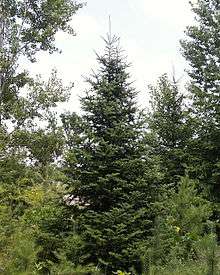fir
English

A fir tree (Abies balsamea)
Etymology
From Middle English firre, from either Old Norse fýri (as in fýriskógr (“pine-wood”)[1] or Old English fyrh, furh (as in furhwudu (“pinewood”),[2] from Proto-Germanic *furhō, *furhijǭ (compare Dutch vuren, Low German Fuhr, German Föhre (“pine”), Danish fyr), from Proto-Indo-European *pŕ̥kʷeh₂ (compare Italian (Trentino) porca (“fir”), from *pérkʷus (“oak”) (compare Latin quercus (“oak”), Albanian shpardh, shparr (“Italian oak”), Punjabi ਪਰਗਾਇ (pargāī, “holm oak, Quercus baloot”)). Related to frith.
Pronunciation
- (UK) IPA(key): /fɜː(ɹ)/
Audio (UK) (file) - (US) enPR: fûr, IPA(key): /fɝ/
Audio (US) (file) - (Scotland), IPA(key): /fɪɹ/
- Rhymes: -ɜː(r)
- Homophone: fur (with the fir-fur merger)
Noun
fir (countable and uncountable, plural firs)
- (chiefly countable) A conifer of the genus Abies.
- 1907, Harold Bindloss, chapter 1, in The Dust of Conflict:
- A beech wood with silver firs in it rolled down the face of the hill, and the maze of leafless twigs and dusky spires cut sharp against the soft blueness of the evening sky.
-
- (chiefly countable) Any pinaceous conifer of related genera, especially a Douglas fir (Pseudotsuga) or a Scots pine (Pinus sylvestris).
- 1954, J. R. R. Tolkien, chapter 3, in The Lord of the Rings:
- we shall find a spot that is sheltered and snug enough, sir. There is a dry fir-wood just ahead, if I remember rightly.
- 1991, Paul Chadwick, Concrete: American Christmas, Dark Horse Books
- I can almost smell the fir scent… resinous, pungent.
-
- (uncountable) Wood of such trees.
Synonyms
- (all countable senses): fir tree
Derived terms
- balsam fir - Abies balsamea
- bristlecone fir - Abies bracteata
- corkbark fir - Abies lasiocarpa
- Chinese fir - Cunninghamia lanceolata
- Douglas fir, Douglas-fir - Pseudotsuga menziesii
- fir adelgid - Adelges abietis
- fir clubmoss - Huperzia selago
- fir mistletoe - Phoradendron pauciflorum
- fir-cone
- firlike
- firleaf beardtongue - Penstemon abietinus
- firless
- firmoss - Huperzia spp.
- firry
- Fraser fir - Abies fraseri
- grand fir - Abies grandis
- Guatemalan fir - Abies guatemalensis
- jointfir - Ephedra
- Momi fir - Abies firma
- Nikko fir - Abies homolepis
- noble fir - Abies procera
- Pacific silver fir - Abies amabilis
- red fir - Abies spp.
- Riga fir - Pinus sylvestris
- sacred fir - Abies religiosa
- Scotch fir - Pinus sylvestris
- sea fir - Abietinaria abietina (syn. Sertularia abietina)
- silver fir - Abies alba
- sprucefir fleabane - Erigeron eximius
- subalpine fir - Abies lasiocarpa
- white fir - Abies concolor
Translations
conifer of the genus Abies
|
|
References
- Oxford English Dictionary, 3rd edn., s.v. "fir" (Oxford, 2000).
- J.P. Mallory, Douglas Q. Adams, eds., Encyclopedia of Indo-European Culture s.v. "oak", "pine" (London: Fitzroy Dearborn, 1997), pp. 407, 428-9.
Irish
Pronunciation
- IPA(key): /fʲɪɾʲ/
Noun
fir m
- inflection of fear (“man; husband”):
- vocative and genitive singular
- nominative and dative plural
Luxembourgish
Etymology
From Old High German furi, from Proto-Germanic *furi. Cognate with German für, English for.
Pronunciation
Derived terms
- fir datt
- fir d'éischt
- fir ze
Manx
Pronunciation
- IPA(key): /fɪr/
Norwegian Bokmål
Old Irish
Pronunciation
- IPA(key): /fʲirʲ/
Mutation
| Old Irish mutation | ||
|---|---|---|
| Radical | Lenition | Nasalization |
| fir | ḟir | fir pronounced with /v(ʲ)-/ |
| Note: Some of these forms may be hypothetical. Not every possible mutated form of every word actually occurs. | ||
Romanian
Etymology
From Latin fīlum, from Proto-Indo-European *gʷʰiH-(s-)lo-.
Pronunciation
- IPA(key): /fir/
Scottish Gaelic
Mutation
| Scottish Gaelic mutation | |
|---|---|
| Radical | Lenition |
| fir | fhir |
| Note: Some of these forms may be hypothetical. Not every possible mutated form of every word actually occurs. | |
This article is issued from
Wiktionary.
The text is licensed under Creative
Commons - Attribution - Sharealike.
Additional terms may apply for the media files.